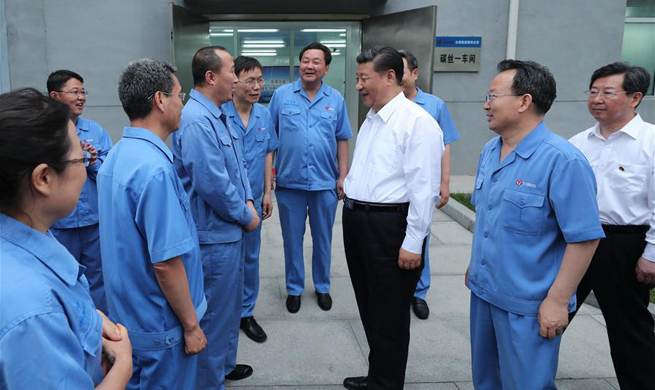by Yoo Seungki
SEOUL, June 24 (Xinhua) -- A South Korean political big shot has stressed the need for a basic income policy and firmer welfare in addition to lower workweek to achieve an inclusive growth in the Fourth Industrial Revolution era.
"Correlation between inclusive growth and the Fourth Industrial Revolution is deep," said Lee Jae-myung, mayor of Seongnam, a city to the southeast of South Korean capital Seoul, in an interview with Xinhua Friday.
Lee, who competed with President Moon Jae-in in the ruling Democratic Party's primary for last month's presidential race, was scheduled to attend the 11th Annual Meeting of the New Champions, also known as Summer Davos.
The Summer Davos would last from June 27 to 29 in China's northeastern coastal city of Dalian, with over 2,000 prominent leaders from politics, business, civil society and the arts set to join.
The meeting will be held under the theme of "Achieving Inclusive Growth in the Fourth Industrial Revolution." Lee will attend the "Social Security Net 4.0" session to make his presentation on his city's basic income policy and how to ensure social security net in the Fourth Industrial Revolution.
"The Fourth Industrial Revolution triggers an extreme development of technology, most of the profits from which are concentrated on a small fraction of capitalists," said Mayor Lee.
Lee pointed out the predicted drop in the number of jobs people can get as the extremely developed technology exponentially increases the productivity, which the mayor said could come closer to zero. It would result in falling decent jobs.
The Fourth Industrial Revolution can bring a better future to humankind by dramatically increasing the productivity, connecting more people to digital networks and undoing the environmental damage which the previous industrial revolutions had done.
Intelligent robots, artificial intelligence, big data, self-driving cars and mobile supercomputing are such examples, which are developing at a very rapid speed.
The dark side of the promising revolution would be the exponentially falling jobs, caused by the super-high efficiency, and the lower number of capitalists than the current one would bear all the fruits people generate.
To tackle the side effects of the fresh revolution, Mayor Lee said, inclusive growth will be required as its core is set at a fair opportunity and a fair distribution of the profits a society makes.
"A basic income policy must be introduced and the existing fiscal welfare program must be strengthened to address the potential peril of the revolution," said Lee.
The falling number of jobs, Lee said, should be dealt with by lower working hours that would increase the number of employees. He put his claims into a historical context, saying the lower workweek was historically the solution to similar problems that occurred during the previous industrial revolutions.
The Seongnam mayor was a pioneer in the adoption of a basic income policy, which is a regular cash payment to all residents unconditionally and without means test. Lee introduced a basic income for the younger generation of his city, called "Youth Dividend."
The Seongnam city brought in various fiscal welfare policies to realize inclusive growth, which Lee said should be a new paradigm of economic development. Without inclusive growth, an inefficiency of the capitalism will deepen, he said.
Thanks to such policies, Lee had won a number of CEO awards in contrast to his well-known image of a belligerent politician. The mayor made a meteoric rise in the latest presidential race, caused by the unprecedented presidential impeachment, over his outspoken comments on the ousted president.
Touching on the Chinese economy, Lee said the world's No. 2 economy has developed at an exponential speed and is still growing at a fast pace above 7 percent.
As seen in the growth paths of the economies of South Korea and Japan, Lee said, a number of side effects could emerge from the rapid growth. But, Lee noted that the correction period would be followed by firmer and stronger fundamentals of the economy.
"China's economy is currently nearing the transition period," said Lee, adding the economy will transform itself into a new stage of growth as the adjustment firms the economy.

















